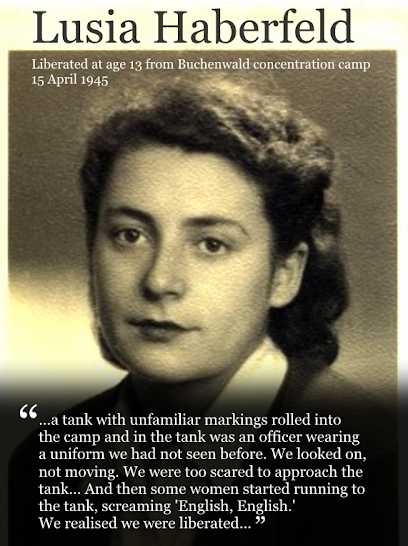Photo Credit: Libby Crozier
Bumping into Lusia in August, 2023 after four years!
Photo credit: Melbourne Holocaust Museum
I wrote an article about Lusia Haberfeld for the Melbourne Holocaust Museum (then known as the Jewish Holocaust Centre) in 2022 when I was still in France.
I specifically thought of Lusia knowing what she did in order to survive and the horrors she spoke of. The loss of her family is heartbreaking and being only a child and witnessing unimaginable things. When I first heard her story in person as she was talking before a group of high school students. I was sitting up the back of the room where the staff had encouraged me to join.
I could not stop myself from unexpectedly crying listening to her speak of losing her little brother and father, and the immense fear when she was almost separated from her mother. The feeling of not knowing if there had even been a sliver of possibility her brother and father had actually survived for years and years afterward, holding on to hope.
The experience of physically going to Auschwitz did leave me feeling very emotional and overwhelmed. In the barracks, I thought of Lusia as a child. I read her memoirs and I could not help but feel incredibly sad for all the prisoners, young and old. Those women and children taken directly from the trains who did not even survive one day but were taken to a beautiful forest to sit for hours before being taken to the gas chambers.
It was worse that even I could have imagined, someone who is so passionate and interested in this part of history. I had seen real footage of liberating the camps and the state of the prisoners then as well as the bodies of those murdered. I know what the Nazis did, which I do not even dare mention here and I was made aware of even more horrific things that the average, decent human being could not possibly believe could be done to their fellow human beings,
From all that I had heard, read, and studied at university; nothing could have prepared me for actually being there. I was taken aback by the beauty around the camp such as the constant chirping of birds, luscious, green forests and flowers. It was enough to make anyone feel unsettled.
Auschwitz is first a museum and living proof of what happened during a time, where many people look back and say will never reoccur. But genocide has continued to happen following The Holocaust.
Racism. Hatred. Discriminination over those less abled. Anti-Semitism. It all exists.
It is important for us to really learn from the past to avoid it happening again in the present and the future.
You cannot say The Holocaust never happened. Especially seeing these places first hand. As Lusia and all the other Holocaust survivors I have met for over a decade, they were there and witnessed it. They told me as a young social worker during their hospital stay about their experiences. How much of a privilege is that? To think that now, the living survivors of The Holocaust were all children and mostly in their nineties. I met survivors who were adults with vivid memories and consciousness of what was occurring but they are gone. We need to re-tell their stories and educate ourselves.
We need to learn from history.
Lusia married another Holocaust survivor and came to Australia in the hopes of a fresh new life, the furthest place away from Europe.
Here, they brought up their children but in full consciousness of the importance of their Jewish heritage and religious traditions, whereas she herself, in her own words, had grown up rather relaxed in that way in her family.
Today, Lusia has a very large family.
This is what Lusia says is the best triumph of all over the Nazis.
Lists upon lists of names of those murdered.
I simply looked up "Haberfeld" and it was page after page after page.
Photo credit: Libby Crozier
I strongly recommend watching Lucia's interview from the 90s below.
She had only begun to speak of her time during the war.
Today, Lusia speaks weekly at the Melbourne Holocaust Centre to achool children and has been doing so for a very long time.
This is a long interview that Lusia took part in.
The final parts of her interview are especially poignant. She is asked about why she feels the need to share her story as well as what she considers to be her response to the Nazis.




